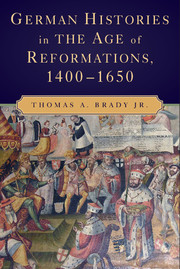Book contents
- Frontmatter
- Contents
- Figures, Maps, and Tables
- Acknowledgments
- A Note on Usages
- Map 1 The Empire in 1547
- Map 2 The Peace of Westphalia, 1648
- Part I The Empire, the German Lands, and Their Peoples
- Part II Reform of the Empire and the Church, 1400–1520
- Part III Church, Reformations, and Empire, 1520–1576
- Part IV Confessions, Empire, and War, 1576–1650
- 13 Forming the Protestant Confessions
- 14 Reforming the Catholic Church
- 15 Limits of Public Life – Jews, Heretics, Witches
- 16 Roads to War
- 17 The Thirty Years War
- 18 German Reformations, German Futures
- Appendix
- Glossary
- Bibliography
- Index
16 - Roads to War
Published online by Cambridge University Press: 05 June 2012
- Frontmatter
- Contents
- Figures, Maps, and Tables
- Acknowledgments
- A Note on Usages
- Map 1 The Empire in 1547
- Map 2 The Peace of Westphalia, 1648
- Part I The Empire, the German Lands, and Their Peoples
- Part II Reform of the Empire and the Church, 1400–1520
- Part III Church, Reformations, and Empire, 1520–1576
- Part IV Confessions, Empire, and War, 1576–1650
- 13 Forming the Protestant Confessions
- 14 Reforming the Catholic Church
- 15 Limits of Public Life – Jews, Heretics, Witches
- 16 Roads to War
- 17 The Thirty Years War
- 18 German Reformations, German Futures
- Appendix
- Glossary
- Bibliography
- Index
Summary
Incensed with indignation Satan stood
Unterrified, and like a comet burned
That fires the length of Ophiuchus huge
In the Arctic sky, and from his horrid hair
Shakes pestilence and war.
John Milton“There is no more friendship on this earth, and each person has become Devil to the other.” When Theobald Höck (b. 1572), a poet of Palatine origin who served as secretary to a powerful Bohemian nobleman, made his lament in 1601, he might have been speaking for – or about – the man who both reigned over and embodied the German lands in this age of iron. From 1583, when he moved his court to Prague, Emperor Rudolph II sat in seclusion in an interior chamber of Hradschin/Hardčany Castle above the city. Outside, an apparently leaderless Empire was sliding into chaos. Rudolph, who suffered from a serious mental disorder, was the most eminent of the Empire's rich crop of “mad princes.” “For long stretches mentally ill,” Rudolph was “so disordered and irrationally frightened that he let imperial business slide for months and years, so depressed that he thought himself bewitched and even attempted suicide.” He was nonetheless Holy Roman emperor and king of both Bohemia and Hungary and, at least to his kingdoms' Catholics, principal protector of the Church Universal.
At the court of this long-lived, somber ruler clustered politicians, scholars, and artists who represented every organized faith and none.
- Type
- Chapter
- Information
- German Histories in the Age of Reformations, 1400–1650 , pp. 349 - 374Publisher: Cambridge University PressPrint publication year: 2009

